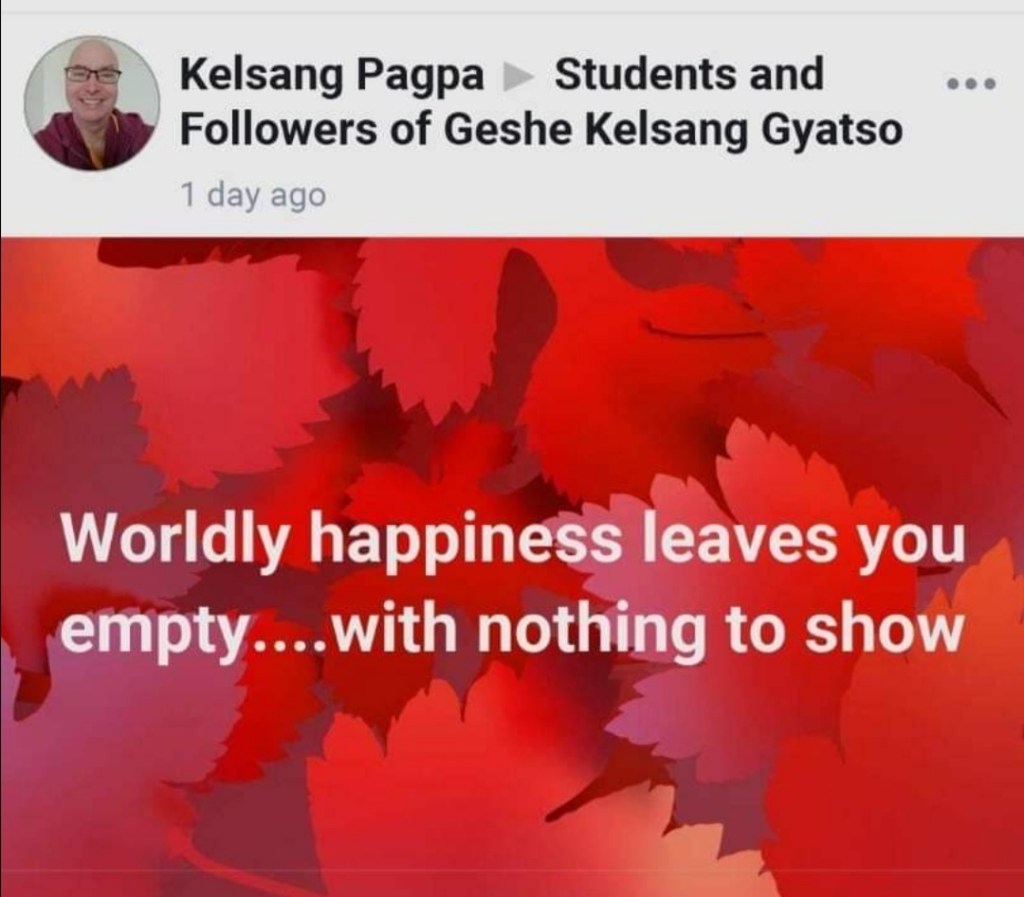
According to Anders (2019) oversimplified and decontextualized Buddhist concepts have been used with hidden agendas in Western groups that call themselves Buddhist. An example is above, where a monk writes that worldly happiness leaves us with ‘nothing to show’. This is an oversimplification of a complex teaching on renunciation. Actually, activities such as spending time with loved ones, play and work can be very meaningful, bring joy to ourselves and benefit others. Whether or not we ‘control our mind’ throughout participation in these activities also does not change their value. (Although many report that attempting to control their mind made life a lot less spontaneous and fun). One of the characteristics of cults is that they destroy your sense of humour and the ability to be spontaneous. The Cult Information Centre also lists ‘reduced sense of irony, vocabulary, use of abstractions and metaphor, and diminished overall intellectual ability’ as potential harm through involvement.
It’s also a contradiction to suggest that we should have something to ‘show’ from everything we do. In my opinion this teaching is used by the NKT with a hidden agenda to suggest that outsiders are mundane, ordinary, deluded and everything they do is pointless, thus serving to reinforce group grandiosity and narcissism within the NKT. (And to motivate people to give their money to the NKT instead of to spend it on enjoying their lives).
Pre-existing depression
Many members have suffered with attachment trauma, disillusionment and resulting depression. Thus this teaching can twist your depression symptoms to appear virtuous, as part of the spiritual path helping you to exit samsara.
I think it is safe to say that most people join cults at a point of vulnerability, and that most who join tend to be somewhat idealistic. Many may have had disappointments in their family situations; many may be seeking positive ways of feeling more connected, more in control of their lives, more purposeful.
Daniel Shaw, The Relational System of the Traumatizing Narcissist
Fear of leaving
One of the characteristics of cults according to Steven Hassan is that they keep people trapped through fear that there can be no happiness and peace outside the group. Members are indoctrinated to believe that leaving will result in a more mundane and ordinary life full of time spent with the rest of us inferior deluded mortals. Lalich & Langone state that ‘The most loyal members (the “true believers”) feel there can be no life outside the context of the group. They believe there is no other way to be, and often fear reprisals to themselves or others if they leave (or even consider leaving) the group.’
I also believe that as many members of the NKT are engulfed and have become institutionalised, with little ability to engage socially with outsiders, they have to tell themselves that ‘worldly’ happiness is a mundane and pointless one to reduce their cognitive dissonance when they feel like they might be missing out.
Recovery
Former members of various cultic groups report that it takes them a while to adjust to engaging in play due to this indoctrination. However when survivors overcome this and eventually start to experience spontaneous joy and find meaning in their day to day lives without judging themselves as spiritually inadequate, they report feeling incredibly free.
Engaging in play is also fantastic for healing trauma:
References
Anders, A. (2019). Silencing and Oblivion of Psychological Trauma, Its Unconscious Aspects, and Their Impact on the Inflation of Vajrayāna. An Analysis of Cross-Group Dynamics and Recent Developments in Buddhist Groups Based on Qualitative Data. Religions, 10(11), 622
https://freedomofmind.com/bite-model/
Lalich, J & Langone, M. (2019). Controlling groups checklist.